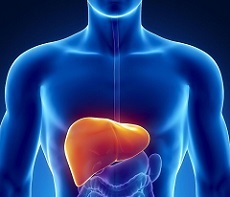 Liver abscess is a disease that occurs as a result of purulent inflammation of the liver tissue, their death and the formation of a cavity filled with pus.
Liver abscess is a disease that occurs as a result of purulent inflammation of the liver tissue, their death and the formation of a cavity filled with pus.
Purulent-destructive formation can be single or multiple. In the diffuse form, multiple abscesses are formed, as a rule, rather small. Single - larger, sometimes there are two or three abscesses.
In most cases, liver abscess develops as a secondary disease, more often in middle-aged and older people. The prognosis of the course of the disease is always very serious and the patient's complete recovery depends on a number of concomitant pathology factors.
Causes of liver abscess
What it is? The cause of liver abscess can be bacteria and parasites (amoeba). Depending on the path of infection, such forms of liver abscesses are distinguished:
- hematogenous- the infection spreads with the blood flow through the vessels of the body;
- cholangiogenic- the infection enters the liver cells from the biliary tract;
- contact and post-traumatic- occur after open and closed abdominal injuries;
- cryptogenic- source of infection not established.
Liver abscess occurs as a complication after dysentery, purulent infection of the body, purulent cholangitis and pylephlebitis. Injuries and intoxications that interfere with liver function can also lead to abscesses.
Among the common causes are perforated appendicitis and inflammation of the biliary tract, cholelithiasis and its complications, tumors of the head of the pancreas or bile ducts, penetration into the lumen of the bile ducts of parasites.
Symptoms of liver abscess
The symptoms of this disease are often atypical, that is, the overall clinical picture can resemble any of the serious diseases of internal organs:
- pneumonia;
- pleurisy;
- heart disease, etc.
The abscess of the liver develops slowly, and symptoms also slowly appear. Due to the development of the internal inflammatory process, the body temperature is constantly increased. It can be accompanied by a shaking chill, feverish condition and the appearance of severe sweating.
There is weakness, nausea, sometimes vomiting, the patient's appetite is gone, weight is reduced. In the right hypochondrium, there are constant, dull pains that give back, right shoulder region and shoulder area. They are preceded by a feeling of heaviness in the right hypochondrium. With percussion, an increase in the size of the liver is found, with palpation, its increased soreness is noted.
Weight loss is often the only complaint at the first stages of abscess development, and therefore the diagnosis in the early stages is difficult. At later stages, jaundice of mucous membranes and skin appears. When compressing the blood vessels of the liver or their thrombosis due to the inflammatory process, ascites may appear (accumulation of fluid in the abdominal cavity).
The main feature of the course of liver abscesses is that the clinic is often masked by the underlying disease, against which and An abscess has developed, therefore, from the onset of the formation of the pathological process to its diagnosis, it often takes a long time.
Diagnostics
At the initial stages of development in an organ of purulent cavities, their detection is difficult. The doctor can suggest a pathology when clarifying complaints, when examining a patient.
From diagnosticsurveys are appointed:
- General blood analysis.
- X-ray examination.
- Ultrasound examination (ultrasound) of the liver.
- Spiral computed tomography (CTD).
- Magnetic resonance imaging (MRI).
- Puncture fine-needle aspiration biopsy (PTAB).
- Radioisotope scanning of the liver.
In the most difficult cases resort to diagnostic laparoscopy. In this case, a special video-instrument is introduced into the abdominal cavity, allowing to examine organs, determine the diagnosis, and, if possible, drain the abscess.
How to treat a liver abscess
Depending on the cause of the liver abscess, as well as the severity of the symptoms of the disease, a treatment regimen is determined.
Therapy of liver abscess is carried out by conservative and surgical methods. In bacterial forms, depending on the type of pathogen, antibiotics are mandatory, with amoebic drugs - anti-amoebic drugs.
Single abscesses are drained under the supervision of ultrasound, this stage of treatment is necessary for the release of pus. Multiple treats are conservative. To extensive surgical intervention resorted to the location of the abscess in hard-to-reach places and if necessary surgical treatment of the underlying disease. To create a high therapeutic concentration of antibiotic in the tissues of the body, the drug is often injected through the hepatic vein, beforehand, a catheter is inserted into it.
All patients with a transferred abscess are assigned a special diet number 5, restorative therapy. The appropriate treatment of the disease, leading to the formation of an abscess, is necessarily carried out. Patients with this profile are observed jointly by a gastroenterologist and surgeon. If necessary, an infectious disease specialist is involved.
The prognosis depends on the form of liver abscess, the severity of the symptoms and the effectiveness of the treatment. In the case of a single liver abscess, with timely measures taken, the prognosis may be favorable. Recovers about 90% of patients, although the treatment is very long. With multiple small abscesses or the absence of treatment of a single ulcer, the lethal outcome is highly probable.

How to choose probiotics for the intestine: a list of drugs.

Effective and inexpensive cough syrups for children and adults.

Modern non-steroidal anti-inflammatory drugs.

Review of tablets from the increased pressure of the new generation.
 Antiviral drugs are inexpensive and effective.
Antiviral drugs are inexpensive and effective.



